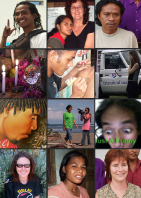Academic & political prisoner.
Founding member of West Papua’s nonviolent campaign for independence.
Spokesperson, United West Papua National Council for Independence.
Jacob Rumbiak was born in 1958 in Ayamaru, a small village in the Birdshead region of Dutch New Guinea. His parents, from Numfoor Island, were teachers; his father also a Protestant pastor, and a passionate nationalist committed to the education of the highland family clans. He was three years old when Indonesia invaded the territory in 1961, and five when President Sukarno’s Republic replaced the United Nations administration in 1963. In 1967 his family fled from the village to live in the jungle under the protection of the OPM (Organisasi Papua Merdeka/Free Papua Organisation).
In 1978, the Indonesian government sent Jacob into exile with an education scholarship to the prestigious Institute of Education (IKIP) in Bandung, West Java. He completed high school, a Bachelor of Arts (Maths) in 1982, and a Doctorandus in Geography in 1987. His Doctorandus (Masters), an investigation of Indonesia’s natural water resources, was read and accepted by the Indonesian National Scientific Institute (LIPI), the Physical Geography Research Institute (Eastern Indonesia), and the Environment Resource Institute of Indonesia.
During his nine-year odyssey in the metropole, Jacob experimented with the ideas and strategies of nonviolent resistance. Most Papuans then were not interested; unable to imagine nonviolence in their highly militarised environment; felt he was wasting time encouraging Javanese to recognise a correlation between their repressed condition and West Papua’s call for independence. Jacob used music-making and performance, education and personal example to induce his Indonesian friends and students to examine the principles of justice and democracy, which he calls the “opposite of violence”. Within twenty years, the movement of democratically-orientated students that he had helped to teach and inspire had deposed of President Suharto – a dismissal of a radically different quality to the military coup in 1966 when up to a million Indonesian citizens were massacred.
Jacob’s quiet effectiveness in educating Indonesians about democracy (and thus re-orientating their perception of West Papua’s independence struggle) is recognised by many Javanese. In 1998, while he was still under house arrest, Legal Aid Jakarta invited him to participate in a press conference where he sat beside the most prominent advocates of democracy at that time – including Abdurrahman Wahid (elected President a year later), Megawati Sukarnoputri (who succeeded Wahid), and Amian Rais (the powerful Speaker of the Peoples Consultative Assembly).
In 1987 Jacob returned to West Papua to teach Astronomy & Meteorology at Cendrawasih University. His friend, Dr Thomas Wainggai, also returned from years of exile in Japan and America. They established the West Melanesia Council to examine the major themes of Dr Wainggai’s doctoral research at Cornell University. Papuans learned, for the first time, how international laws had been manipulated to facilitate the Indonesian occupation. They also learned that written (western) history reflected their own (oral) legends, through which they understood themselves to be Melanesians of the Pacific. Most radically of all, the scholar contextualised a nonviolent movement for self-determination within West Papua’s complexion of religious custom and belief.
Nonviolence gained the immediate approval of West Papua’s big men in the highlands, the leaders of the traditional religions, who considered it a philosophy with roots in their traditional beliefs and in Christianity, and a practical approach to independence. Jacob worked with students and ex-political prisoners in the high schools and the universities, many of them the sons and daughters of the highland chiefs. His vocal groups, called “prayer troops” performed in churches throughout the territory, encouraging villagers to believe in themselves and assume responsibility for their own development, to understand the discipline required for nonviolent resistance, to envisage their role in a modern nation-state. By the mid-nineties, these bare foot activists had formed the West Papua National Youth Awareness Team – which by the end of the decade had 18,000 members working in West Papua, in eight other Indonesian provinces, and along the north coast of Papua Nugini.
In December 1988, Dr Wainggai and his Japanese wife were arrested and imprisoned. A year later, Jacob and three others were also ‘listed’ by the military. They sought protection in the PNG Consulate, and called for talks with the government. Fifteen days later, in the midst of more arrests, thousands of Papuans were still demonstrating in the streets of Jayapura. (Tom Hyland, The Age newspaper’s correspondent in Jakarta at the time, confessed he wrote three or four lines about some “civil unrest”). The Japanese and Australian Ambassadors in Jakarta flew to Jayapura to negotiate with the dissidents; Papua Nugini’s Prime Minister, Rabbie Namaliu, offered them 30,000 kina to move over the border. Finally, on Christmas Eve, Foreign Affairs Minister (Ali Alatas), Minister for Defence (Benny Murdani) and Chief of the Armed Forces (General Try Sutrisno) arrived – with hampers of cigarettes and whiskey – but no mandate, or desire to talk.
Ten years later, Dr Abdurrahman Wahid, newly elected President of the Indonesian Republic, exonerated Jacob of the charge of subversion. He had served ten years of a seventeen-year prison sentence. Five years in ‘death row’ Kalisosok, where he completed a theology degree. Two in Tangerang, confined to a dark stone cell at the top of a tower. Twelve months in Cipinang with Xanana Gusmao, and another twelve under house arrest in military institutions. He had read and re-read a book he’d been given about Napoleon Bonaparte … isolated on Elba Island, reflecting on an image of Christ on the Cross, wondering why “Jesus, with no soldiers, and no country, is a big person until now; and me, an Emperor, who controlled Europe with millions of soldiers, ends up in exile on an island”. Jacob attributes his survival of torture and isolation to the presence of a loving God, and his time in prison as a “blessed experience, and a journey into the depths of suffering”.









